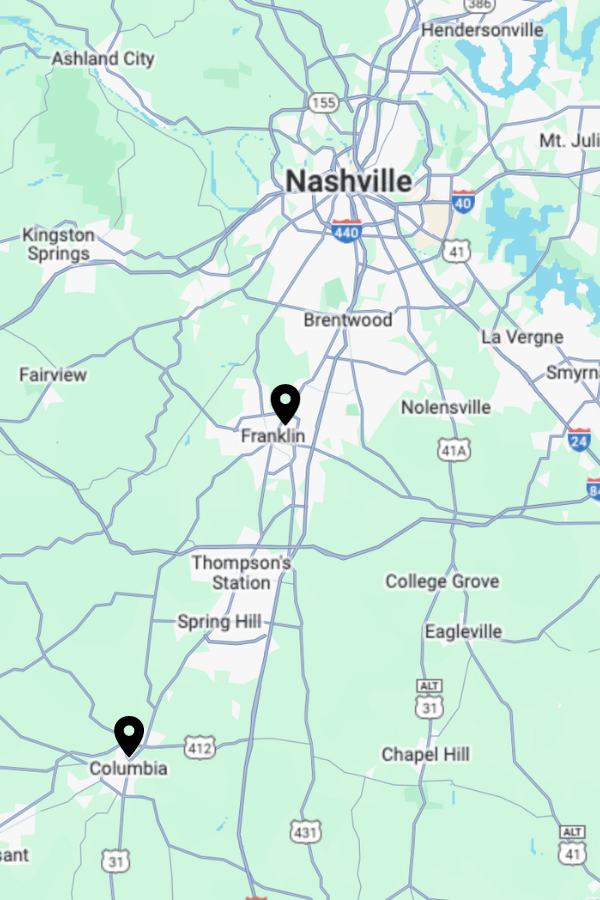Apex Recovery offers comprehensive rehab services across various facilities located in Tennessee. These centers provide tailored treatment plans, integrating evidence-based therapies to support you on your journey to recovery, focusing on substance abuse and mental health challenges within supportive, healing environments.
Apex Addiction Recovery Center specializes in rehab treatment for substance abuse and dual diagnosis, offering personalized care for people contending with addiction alongside mental health issues. Our holistic approach combines medical, psychological, and supportive therapies to address the complex needs of clients, promoting recovery and long-term wellness.
Our Addiction Treatment Programs
Our rehab therapy programs include couples therapy, group therapies, and individual therapies, with all clientele receiving multiple individual and group sessions daily. Rehab therapy is a crucial element of understanding where addiction comes from, what causes it, and what continues to lead someone into relapse. Our Tennessee rehab programs focus on all elements of early long-term recovery, helping people uncover and understand why they follow certain behavioral patterns or co-occurring disorders that lead to addiction. Our medical health professional rehab specialists are never dogmatic, judgmental, or punitive; they are simply here to help.
- Medication-assisted detox treatment
- Chemical dependency treatment
- Dual diagnosis treatment
- Program treatment therapies

Addiction Treatment Programs in Tennessee
Addiction treatment programs are specialized therapeutic programs for various substance use disorders, including Alcohol Use Disorder, Opioid Use Disorder (Heroin, Crystal Meth, and Opiates), Cocaine Use Disorder (Crack and Cocaine), marijuana, hashish, and cannabis addiction, prescription drug addiction (Benzodiazepines, OxyContin, Xanax), and other drug addiction (Ecstasy (MDMA) and Amphetamines). Note: these are common and this is not an exhaustive list.
Alcohol Use Disorder
Search for “alcohol treatment programs near me”, like Apex Alcohol and Drug Addiction Recovery Center offers, and you’ll find evidence-based therapies and personalized care plans to address the physical, emotional, and psychological aspects of AUD. The program includes detoxification, counseling, group therapy, and aftercare planning, aiming to equip people with the tools and support needed for sustained sobriety and recovery.
Opioid Use Disorder (Heroin and Opiates)
Opioid treatment programs for Opioid Use Disorder, covering Heroin and Opiates, offer a comprehensive approach that includes medically supervised detoxification, medication-assisted treatment (MAT), individual and group therapy, and relapse prevention strategies. Tailored to meet individual needs, this program aims to address the complexities of opioid addiction and support long-term recovery and wellness.
Cocaine Use Disorder (Crack and Cocaine)
An addiction treatment program for Cocaine Use Disorder focuses on overcoming the powerful psychological dependence associated with crack and cocaine use. Through a blend of cognitive-behavioral therapy, counseling, group support, and relapse prevention techniques, the program addresses underlying issues, promotes healthy coping mechanisms, and guides patients towards a path of sustainable recuperation.
Prescription Drug Addiction (Benzodiazepines, OxyContin, Xanax)
Specialized recovery programs for prescription drug addiction include Benzodiazepines, OxyContin, and Xanax dependencies. Through a combination of medically supervised detoxification, counseling, and medication management, patients receive support to help manage the physical and psychological aspects of addiction. The program focuses on promoting sustainable recovery and empowering people to regain control over their lives.
Marijuana, Hashish and Cannabis Addiction
Intervention programs for marijuana, hashish, and cannabis addiction provide personalized care customized to handle the distinct challenges of cannabis dependency. Through a combination of counseling, cognitive-behavioral therapy, and holistic approaches, people receive comprehensive support to overcome addiction, manage cravings, and develop coping strategies for long-term sobriety and improved well-being.
Other Drug Addiction (Ecstasy (MDMA) and Amphetamines)
Drug treatment programs for other drug addictions, including Ecstasy (MDMA) and Amphetamines, are designed to face the unique trials posed by stimulant dependency. Utilizing a blend of evidence-based therapies, such as cognitive-behavioral therapy, and individual and group counseling, these substance abuse treatment programs tackle both the psychological and physical aspects of addiction.

- Please complete and send the form below.
- One of our staff members will contact your insurer to check your coverage.
- We will contact you promptly with the results and to discuss the next steps.
Insurance Verification
"*" indicates required fields
Finding Addiction and Mental Health Treatment Programs in Tennessee
If you’re seeking addiction and mental health treatment programs, Apex Substance Addiction Recovery Center offers premier facilities in Tennessee. With personalized care plans and evidence-based therapies, Apex Drug and Alcohol Addiction Recovery Center provides comprehensive support for recovery. Call (877) 881-2689 today to begin your journey towards wellness. You can also contact us online or check your insurance here to get started.
Free Addiction Assessment
Schedule a free, confidential assessment with a licensed clinician. Apex Recovery can check your insurance coverage levels for drug and alcohol addiction, and mental health treatment.

Treatment Programs in Tennessee (TN)
Apex Addiction Recovery Center in Tennessee operates two state-of-the-art facilities. These strategically positioned local locations are ideal for people seeking effective addiction and mental health treatment, within reach.
Apex Recovery Franklin
4601 Carothers Pkwy STE 250A
Franklin, TN 37067
Apex Recovery Columbia
2710 Trotwood Ave STE A & B
Columbia, TN 38401
An Inpatient Program with a Difference
Before you select an inpatient program, please realize that not all alcohol and drug rehab centers are created equal. At Apex Recovery, we strive to give our clients the very best counseling, detoxification, and treatment in all of Tennessee.
We know the struggle of addiction and what kind of toll it can take on an individual’s life. That’s why we’ve made it our mission to guide individuals through the daunting stages of recovery. Our treatment programs for substance abuse are catered to each of our clients so that we can give every addict the best therapy possible. We also offer the very best therapists for our rehab program, ensuring that every person that we treat has the best chance at success in recovery.
Holistic Treatment Programs in Tennessee
Holistic treatment programs approach addiction and mental health recovery by treating the whole person, rather than focusing solely on the symptoms of substance abuse or mental health disorders. These programs integrate conventional medical treatments with alternative therapies to address physical, psychological, spiritual, and social needs.
Techniques such as yoga, meditation, acupuncture, art therapy, and nutritional counseling are often employed alongside counseling and medication management. The goal is to achieve balance and wellness across all aspects of a person’s life, promoting healing from within. By considering the interconnectedness of different facets of health, holistic programs help foster a more sustainable and comprehensive recovery, empowering people to build a foundation for long-term well-being and resilience against relapse.
Treatment Programs for Dual Diagnosis and Co-Occurring Disorders in TN
Treatment programs for Dual Diagnosis and co-occurring disorders focus on the complex challenges faced by people who simultaneously experience substance abuse issues and mental health conditions. These programs recognize the complex relationship between addiction and mental health, offering an integrated treatment approach that tackles both aspects concurrently.
Through a combination of detoxification, psychiatric care, behavioral therapies, and support groups, patients receive customized comprehensive care. The goal is to provide holistic healing, treating not just the symptoms but the root causes of the disorders. By honing in on both conditions together, these intensive outpatient treatment programs improve outcomes, reduce the risk of relapse, and enhance overall quality of life.
Are you or a loved one looking for an outpatient rehab near me? Contact APEX Recovery today at 877.630.4077. One of our trained professionals will help find the best treatment option near you.

What are Tennessee Addiction and Mental Health Treatment Programs?
Addiction and mental health treatment programs are specialized care plans designed to address the interwoven issues of substance abuse and mental health disorders. These programs recognize the complex relationship between addiction and mental health, offering an integrated treatment approach that tackles both aspects simultaneously. Treatment typically involves a combination of detoxification, counseling, medication management, and behavioral therapies.
They provide a comprehensive healing process that addresses the root causes of addiction, gives people coping strategies for mental health challenges, and promotes overall well-being. By focusing on the whole person, these programs encourage sustainable recovery, improve quality of life, and prevent relapse, ensuring people have the support and resources needed for a successful journey to health. Searching for outpatient treatment near me or need to verify your insurance? Contact us today at 877.630.4077 or visit our insurance page for coverage information.
Substance Abuse Detox Programs
Substance abuse detox programs are the critical first step in the journey towards recovery, providing a medically supervised process designed to safely eliminate toxins from the body after prolonged drug or alcohol use. These programs offer a structured environment where people can undergo withdrawal with the support of medical professionals who manage symptoms and maintain safety.
Detox is personalized, taking into account the type of substance used, duration of abuse, and individual health needs. Following detox, patients are encouraged to transition into further treatment programs that address the psychological aspects of addiction. Through comprehensive care, detox programs help to stabilize individuals, preparing them for the therapeutic work ahead in their recovery journey.
Addiction and Mental Health Treatment Programs
Addiction and mental health inpatient rehabilitation and residential treatment programs provide immersive, 24-hour care for people dealing with severe substance abuse and co-occurring mental health disorders. These rehabilitation programs offer a safe, structured environment away from everyday stressors, with a deep focus on recovery. Treatment includes detoxification, individual and group therapy, medication management, and holistic approaches.
The goal is to address the root causes of addiction, equip patients with coping strategies for managing mental health challenges, and promote personal growth. By living on-site, patients are supported by a multidisciplinary team dedicated to their recovery, offering a continuum of care that promotes lasting wellness and prepares them for successful reintegration into daily life.
Addiction and Mental Health Treatment Partial Hospitalization Programs
Addiction and mental health treatment Partial Hospitalization Programs offer an intensive level of care for those seeking recovery while allowing them to live at home. These programs typically operate during the day, several days a week, providing a structured environment similar to inpatient treatment but with more flexibility.
PHPs focus on treating substance abuse and co-occurring mental health disorders through a comprehensive approach that includes individual and group therapy, medication management, and holistic therapies. Designed for people transitioning from residential treatment or needing more support than outpatient services, PHPs aim to reinforce coping strategies, manage symptoms, and promote functional independence, creating a smoother transition to everyday life while maintaining a strong focus on recovery.
Medication-Assisted Treatment (MAT)
Medication-Assisted Treatment (MAT) combines FDA-approved medications with counseling and behavioral therapies to treat substance use disorders. MAT is particularly effective for opioid and alcohol addiction. Medications help manage withdrawal symptoms, reduce cravings, and normalize brain chemistry, allowing people to focus on recovery. Counseling and behavioral therapies address underlying issues contributing to addiction and support long-term sobriety.
MAT is personalized treatment for each person’s needs, with plans regularly reviewed and adjusted. Research shows that MAT significantly improves treatment outcomes, including reduced relapse rates and increased retention in substance abuse programs. It’s an evidence-based approach that offers hope and support for those on their journey to recovery from addiction.
Looking for an MAT program near me? Contact APEX Recovery today at 877.630.4077. One of our admissions specialist will help find the best treatment option near you.

Addiction and Mental Health Counseling and Therapy Programs in Tennessee
Apex offers a variety of addiction and mental health counseling and therapy programs, including Cognitive-Behavioral Therapy (CBT), Dialectical Behavior Therapy (DBT), Trauma-Focused Therapy, Individual, Group and Family Therapies, Transcranial Magnetic Stimulation (TMS) Therapy, Eye Movement Desensitization and Reprocessing (EMDR) Therapy, and Holistic Therapies such as yoga, meditation, and acupuncture. Please note, these are common therapies and not a full list.
Cognitive-Behavioral Therapy (CBT)
Cognitive-Behavioral Therapy (CBT) is a widely used therapeutic approach focusing on identifying and altering negative thought patterns and behaviors. By addressing cognitive distortions and maladaptive behaviors, CBT helps people develop coping strategies, promoting healthier thinking patterns and leading to positive changes in behavior and emotions.
Dialectical Behavior Therapy (DBT)
Dialectical Behavior Therapy (DBT) is an evidence-based treatment that combines cognitive-behavioral techniques with mindfulness strategies. It emphasizes acceptance and change, helping people manage intense emotions, improve interpersonal relationships, and develop skills for distress tolerance and emotional regulation. DBT is particularly effective for those struggling with mood disorders, borderline personality disorder, and substance abuse.
Trauma-Focused Therapy
Trauma-focused therapy is a specialized approach designed to help people heal from the effects of trauma. By integrating various therapeutic techniques, it focuses on the emotional, psychological, and physical impacts of traumatic experiences. This therapy aims to help patients process trauma, develop coping mechanisms, and rebuild a sense of control and empowerment over their lives.
Individual, Group and Family Therapies
Individual, group, and family therapies are cornerstone modalities in addiction and mental health treatment. Individual therapy offers personalized attention and custom-made strategies for recovery. Group therapy provides peer support and shared learning experiences. Family therapy involves loved ones in the healing process, addressing relational dynamics and promoting a supportive environment for recovery. Each modality complements the others for holistic healing.
Transcranial Magnetic Stimulation (TMS) Therapy
Transcranial Magnetic Stimulation (TMS) Therapy is a non-invasive procedure that uses magnetic fields to stimulate nerve cells in the brain. It’s primarily used to treat depression that hasn’t responded to other treatments. TMS is administered in outpatient settings and involves repetitive magnetic pulses targeting specific regions of the brain associated with mood regulation.
Eye Movement Desensitization and Reprocessing (EMDR) Therapy
Eye Movement Desensitization and Reprocessing (EMDR) Therapy is a psychotherapy approach used to treat trauma and related conditions. It involves recalling distressing memories while focusing on external stimuli like hand movements or sounds. This process helps desensitize traumatic experiences, helping the reprocessing of memories and alleviating associated emotional distress, leading to symptom reduction and healing.
Holistic Therapies (e.g., yoga, meditation, acupuncture)
Holistic therapies, such as yoga, meditation, and acupuncture, complement traditional treatments by addressing the mind, body, and spirit. Yoga enhances physical well-being and promotes relaxation. Meditation cultivates mindfulness and emotional balance. Acupuncture stimulates specific points to alleviate stress and promote healing. These holistic approaches contribute to overall wellness and support the recovery journey.

Medications Used for Substance Use Disorder Treatment
Medications for Substance Use Disorder include treating opioid addiction with Methadone, Buprenorphine, and Naltrexone, while medications for treating alcohol addiction comprise Disulfiram, Naltrexone, and Acamprosate. It’s important to note that these are common, this is not a complete list, and medication may only be prescribed in severe cases under the supervision of a qualified healthcare professional.
Medication for treating Opioid Addiction
Medication for treating opioid addiction typically includes Methadone, Buprenorphine, and Naltrexone. Methadone and Buprenorphine are opioid agonists that reduce cravings and withdrawal symptoms, while Naltrexone blocks the effects of opioids, discouraging relapse. These medications are often used in combination with counseling and behavioral therapies to support people on their journey to recovery from opioid addiction.
Medication for treating Alcohol Addiction
Medication for treating alcohol addiction commonly includes Disulfiram, Acamprosate, and Naltrexone. Disulfiram works by causing unpleasant reactions when alcohol is consumed, discouraging drinking. Acamprosate helps reduce cravings and withdrawal symptoms. Naltrexone blocks the pleasurable effects of alcohol, reducing the desire to drink. These medications are often used alongside counseling and behavioral therapies for comprehensive treatment.
